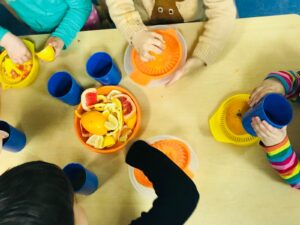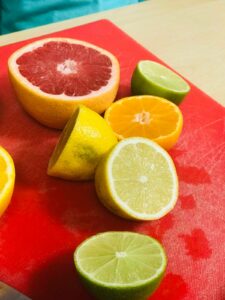One of the most common questions we get asked by parents is “How can I make my child eat more vegetables?” At Keren’s Nursery, we know how important nutrition is in ensuring that children grow up physically healthy and strong. For years, our provision has encouraged children to eat their five-a-day, through our menus, nutritious meals approved by dietitians, constantly following updates in the “Eat Better, Start Better” guidelines, and participating in programmes like “Healthy Early Years”.
This year, we’re progressed even further, with the introduction of a new activity called TastEd, or Taste Education.
Taste Education, based on the Sapere method which gained huge popularity in countries like Finland and Japan, was brought to the UK by the TastEd charity. It is a form of sensory food education, delivered through planned, adult-led activities, which aim to make children feel excited and curious about food. Unlike set mealtimes in the nursery, which are in themselves valuable opportunities to talk about and explore food, TastEd activities do not necessarily involve eating.
Delivered in a relaxed and informal environment, TastEd has only two rules:
- Nobody has to try
- Nobody has to like
The pressure of trying or tasting something that does not look appealing to the children is lifted from the very beginning. Each session begins with a reminder of the rules and a recap of the five senses. Some sessions will focus primarily on one sense (“Guess the smell”), while others will make use of all five senses, in a fully immersive sensorial experience.

The children’s interest was piqued from the very first session when they were presented with a large basket, filled with carrots. Over the following weeks, the children surprised themselves and us with their willingness to try every fruit and vegetable brought to them, from lemons and grapefruits to beetroots and sweet potatoes. They learned about produce through touching, prodding, smelling, licking, feeling, or even listening – a child rightfully noted that raw carrots make lots of noise when you eat them, while cooked carrots are “quiet”.
TastEd fits perfectly within our curriculum and its approach reaches every area of development we focus on. Through rich dialogue opportunities, children enhance their vocabulary, their communication, and understanding. Mathematical concepts such as counting or comparing quantities are more accessible when children can manipulate produce and feel their weight, their size, and their shape. We are learning about the world, where different produce comes from, and how other cultures use them. We develop physical skills as we learn how to cut or squeeze fruit into juice. Tasting something new, something that may have been scary to taste before is a huge accomplishment and a great boost to children’s self-confidence and pride. We even dabble with science as we learn how plants grow, what’s the difference between fruits and vegetables, or how different nutrients work on our bodies. Questions are asked to challenge thinking and there are no wrong answers, so children develop a positive identity as learners and their curiosity continues to grow.

In a study conducted two years ago, the British Dietetic Association came to the sad conclusion that less than 10% of children under the age of 12 in the UK eat their five portions of fruit and vegetables a day. Most parents are reporting difficulties with “fussy eaters”. As a nursery, we are in a privileged position of offering children role models amongst their peers. It is so much easier to encourage a child to eat their fruits and vegetables when they see their peers having a go at it. And when we add carefully planned, quality learning experiences, we are well on our way to raising children who love and enjoy nutritious food.









